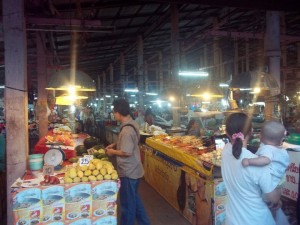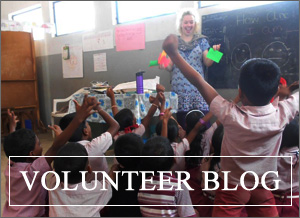My friend and I were volunteering to teach English in the North of Thailand in a city called Chiang Rai for 5 months. Our school was a primary school in a rural area just outside Chiang Rai city. We were both extremely nervous, excited and wondering what adventures the next 5 months would bring…
The First Day at School:
When we first arrived at the school all of the children and teachers were waiting to greet and welcome us with flower arrangements that the children had made themselves. We then had to introduce ourselves, explaining briefly where we were from, how old we were and how long we were planning to teach for. The children were extremely excited and intrigued to who we were and seemed interested in getting to know us. Everyone was so welcoming and we felt a part of the team from the very first day.
After the introductions the children retreated to their classrooms and we were shown around the school visiting each class. Our time tables were handed to us and we made an agreement on what grades we would teach. I decided that I would teach the Primary Class, Grade 4-5 and 6. This is when I realised that no matter how much planning or thought goes into your first day, you can never really be prepared for what it will bring. I felt extremely nervous at the fact of actually teaching a class due to having limited experience of teaching over the age of eight years. Luckily I was told to observe my classes before teaching them the following day. However, be warned! Always have something prepared beforehand so you are ready to teach. My friend was told to teach all of her grades on her first day! Even though this seems scary, you will be surprised at what games and ideas you think of when you’re thrown in at the deep end.
Observing my grades seemed overwhelming at first due to having 27 children in my Primary Class, 27 in my Grade 4-5 and 15 in my Grade 6! All grades had limited resources with teachers that spoke little English. However, after introducing myself to each grade and seeing all of the children’s faces light up, so eager to learn, I could not wait to start teaching the following day!
Teaching at School:
I taught my Primary class and Grade 6 twice a week and Grade 4-5 every day for 1 hour. We were at school 5 days a week from 8am until 4pm, so in our spare time we were planning for our next classes, marking the children’s work, creating displays of the children’s work and spending time with the teachers, helping them with their English. Being given the chance to observe on my first day I realised that many of the children had mixed abilities. For example, my Primary class and Grade 4-5 had a high number of children with behaviour and learning difficulties. Therefore, I decided to make English books and folders for each child in order to demonstrate what work they can do. This would give each child a sense of pride of their individual work and also encourage them to work toward higher achievements. Many children did not have their own English books due to the school being within a rural community where levels of deprivation are high.
Playing games and singing songs with children always goes well as it is fun for everyone. However, as I experienced, many children wanted to play different games to others and expect that you will play games with them every lesson. Here is when the arguments will erupt between the children. Therefore, it is a good idea if you are a long term volunteer to add structure to your class. We found that due to teaching for 5 months we would devise an English curriculum guide in order to teach the children effectively. As much as the children love to play games, there are only so many games you can play until they start to get repetitive and in turn the children become restless.
We split the English lessons into three working groups:
- Teach English through play and games.
- Learn English through creative arts such as painting, messy play, singing, music and movement and group activity work.
- Learn English through formal work such as written work in books, work sheets, colouring, gluing and sticking, brain stimulating activities such as word searches or hangman (the children really enjoy these!)
This made every lesson different, fun and stimulating as well as adding structure and regime to your teaching style. However, these depend on resources within your school. We were lucky due to having access to a computer and photo copier, with an arts and crafts shop not far from the school. Some settings can be very limited, where you have to think on your feet and use basic tools to teach. For example, I decided to take my Grade 4-5’s on a ‘forest walk’ around the school to understand about nature and weather. We looked at leaves, trees, the different animals and insects in the school grounds saying what they were in English and in Thai. We also used to play a variety of sports games as the children loved competitions such as dodge ball, football, volleyball and running activities.
It is a really good idea to learn a little of the language of the country you will be teaching in. By learning the language it makes it easier to explain your English lessons to the children and it’s always a good tool to know and understand another language.
Spare time:
Weekends were spent travelling around the North of Thailand with our host family and friends we made. We have been to many temples, markets, restaurants, national parks, zoo’s and climbed one of the highest mountains in Thailand! Many great and exciting experiences have happened in Thailand, from travelling to some of the most beautiful and surreal places in Thailand to seeing the different culture and religion that plays a big part in Thai lives.
It is a good idea to read up on the culture and religion of the country you plan to travel to beforehand as it will benefit you in the future and may not seem as such a big culture shock when you arrive. If you are a long term volunteer you may have some time off from school, due to school holidays like we did. This is a perfect time to travel and make the most of your time in that country!
Thailand has been one of the best experiences of my life! We learnt so much about a different way of life, culture and religion. We made a difference by teaching English to children who live in poor conditions and seeing them improve day-by-day in their English language as well as having fun, smiling and laughing with happiness was a joy every day. That is what has made our time in Thailand worthwhile and I would definitely do it again in a second! A big thank you to VESL for making this come true and I wish the best of luck to VESL’s future volunteers!
Emma Powell, VESL Volunteer in Thailand, 2010-11




Comments are closed.